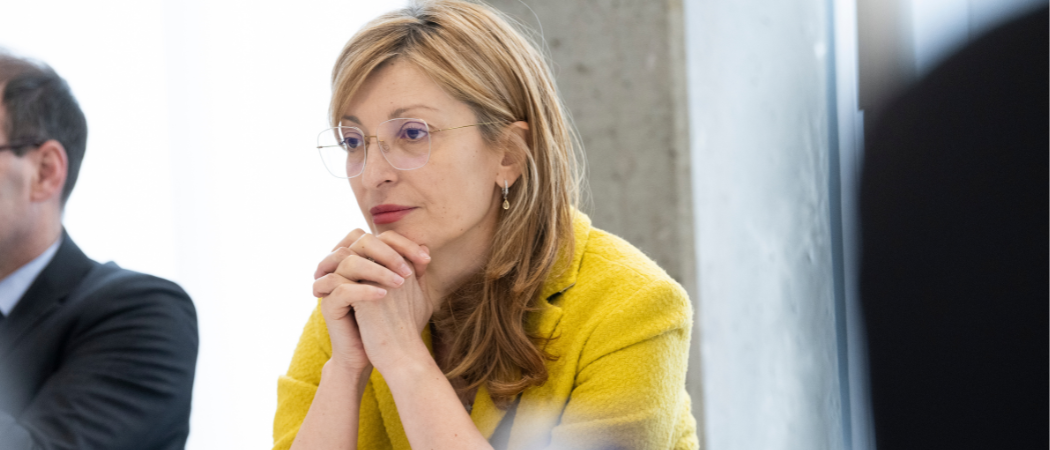Ekaterina Zaharieva claimed AI could boost materials science patents by up to 40%. But the source is likely a retracted preprint

EU research Commissioner Ekaterina Zaharieva. Photo credits: Mikko Stig / European Union
The EU’s research commissioner appears to have cited a widely discredited and possibly fabricated study in a speech extolling the benefits of AI in science.
Ekaterina Zaharieva has made deploying AI to accelerate science a key priority, with nearly €100 million set aside for projects in 2026-27 under the EU’s Horizon Europe research programme.
Ahead of the launch of the EU’s AI in science strategy this week, Zaharieva gave a speech on September 25 in which she said that “in materials science, AI could drive patent filings up by almost 40%.”
However, it seems that her source is a high-profile preprint from a Massachusetts Institute of Technology PhD student, which was retracted in May following a scandal over its veracity and an investigation by the university.
A Commission spokesperson did not deny the retracted study was the source of Zaharieva’s claim.
Artificial Intelligence, Scientific Discovery, and Product Innovation, posted to the arXiv repository in December 2024, made headlines earlier this year because it claimed to show huge boosts in productivity for corporate scientists who adopted deep learning tools to help automate the process of discovering and testing new materials.
“AI-assisted researchers discover 44% more materials, resulting in a 39% increase in patent filings and a 17% rise in downstream product innovation,” it claimed.
But then, in May, MIT disowned the research following a review, and said it should be “withdrawn from public discourse.”
In a widely covered statement, the university said it had “no confidence in the provenance, reliability or validity of the data and has no confidence in the veracity of the research contained in the paper.”
Materials scientists also raised concerns about the paper, suggesting its data seemed too good to be true, and may have been entirely fabricated. The author, Aidan Toner-Rodgers, is no longer at MIT, and the preprint has been withdrawn from arXiv. He did not respond to a request for comment.
Likely the source
Science|Business contacted several materials scientists who work with AI tools, and none could point to any other possible source of Zaharieva’s claim than the retracted study.
“I can safely say that we are unaware of any research that has quantified the impact of AI on the number of patents in the materials area,” said Anthony Cheetham, a materials researcher at the University of California, Santa Barbara.
The retracted study is “likely” the source of her claim, said Johannes Margraf, an expert in physical chemistry and machine learning at the University of Bayreuth.
Asked for the source of Zaharieva’s claim, a Commission spokesperson did not directly respond, but said that “other studies, including a recent contribution in Nature, point to a similar scale of potential impact.”
“These findings suggest that AI is already influencing materials science in significant and measurable ways, and that its contribution will grow further as integration with experimental and computational methods deepens,” they said. Zaharieva’s patent-boosting claim was still up on the Commission’s website at the time of publishing.
Related articles
- EU launches AI strategies to boost competitiveness and science
- AI in science: is it useful?
- EU science advisers back call for a ‘CERN for AI’ to aid research
However, the Nature feature article referenced by the Commission does not include any mention of AI’s impact on patents specifically. It also quotes several materials scientists who are somewhat sceptical of claims by large US tech firms to have invented AI tools that will drastically accelerate the discovery of valuable new materials.
Too little data
Those scientists told Science|Business that while AI held out some promise to improve materials science, the picture was complex.
There is currently “simply too little data” for AI to predict whether a new material will have certain useful properties or perform well, said Berend Smit, a chemical engineering professor at the Swiss Federal Institute of Technology in Lausanne.
AI cannot replace experts in materials science research, “not because of a fundamental limitation of AI but because of a very practical reason: the required experimental data must be generated by people performing these measurements,” he said.
Instead, AI might be useful speeding up the research workflow, “rather than trying to solve everything on its own.”
Grandiose claims
Margraf said there were “clear examples” that machine learning “is transforming materials science for the better.” Advances in automation and image recognition had also helped speed up the discovery of new materials.
However, this was not a sudden, recent development, he said. These forms of AI had been speeding up materials science for the past 20 years.
What changed recently was that materials science had benefitted from the broader boom in AI research. While “grandiose claims” of AI materials discovery by US tech firms “don't quite hold up”, Margraf said, “it’s undeniable that real progress has been made in academia and industry.”
“AI no doubt holds promise for the discovery of new materials but most recent claims of new materials have not been substantiated,” said Cheetham in a joint statement with his colleague at Santa Barbara, Ram Seshadri.
However, machine learning was speeding up more conventional materials simulation methods, they said.





 A unique international forum for public research organisations and companies to connect their external engagement with strategic interests around their R&D system.
A unique international forum for public research organisations and companies to connect their external engagement with strategic interests around their R&D system.